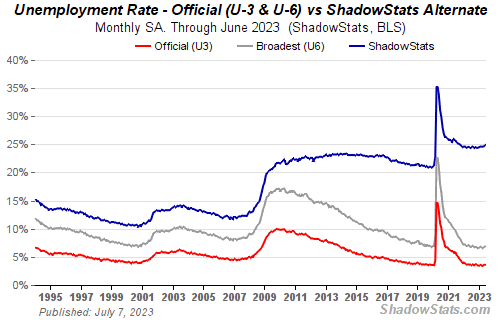Originally published at Benfell Blog. Please leave any comments there.
Alternet has probably as good an article on Shadow Government Statistics as you’re going to find. It’s about John Williams, whom most most economists refuse to even talk about. That’s because he challenges the orthodoxy on the government’s economic statistics. The underlying data is manipulated, he says, in ways which appear to benefit incumbents in political power.
If he’s right–and as time goes by, I’m taking him more seriously–even my measure of unemployment is simply wrong. My U3 fails to consider people who are working fewer hours than they’d like. It probably does include discouraged workers, because I use the highest measured labor force participation rate applied to the current population estimate. That might overstate the labor force, but my assumption is that if opportunity were truly present, these people would be taking jobs because it isn’t like they don’t need the money.
So here’s my U3 (which I named after my cat):

Here’s Williams’ U6 (with the BLS U3 in red, BLS U6 in grey):
Here’s what Williams has to say about the government’s definition of discouraged workers:
Up through 1994, this was the definition of discouraged workers: You met all the other qualifications, but you haven’t looked for work in the last four weeks,” Williams said. “In ’94, they changed the definition so that in order to be discouraged, you had to have not looked for work in the last four weeks, but you had to have worked in the last year. The result knocked several million people out of consideration.
And here’s my problem:
[Maurine] Haver [chair of the statistics committee for the National Association for Business Economics] has little regard for Williams’ argument about discouraged workers. “If someone has done absolutely nothing in one year’s time, I frankly think they’re not very serious about working,” she said. “The U-6 gives you a measure of the very worst in unemployment, period. I don’t think there are any more people who truly are out of a job beyond that, people who won’t get their butt out of bed. If you have done nothing in a year, do you really think that person is a member of the labor force?”
So I’m “not very serious about working.” I finally gave up chasing thunderstorms hoping lightning would strike because even with my Master’s degree and even with a professionally-prepared resumé, I wasn’t getting any traction. I finally did get an interview last month, but even though it went well and they think I’m “very qualified,” they’ve covered their positions. (I might get a job if someone dies.)
Simply put, I’m not seeing the process of finding advertised positions and sending in applications as anything other than a waste of time. And the only alternative means marketing myself as a consultant. So I guess I’m “not very serious” because I can’t do marketing, even the very minimum that our socioeconomic system regards as necessary to find employment. (But “Octomom” is.)
It’s true that there are jobs I will not accept and am not pursuing. If Haver had had my experience, she might understand. But for me, Haver’s arrogance is breathtaking. It isn’t like I’m just lying here on the dole. For one thing, I’m a Ph.D. student. For another, because my last teaching job, as a Teaching Associate at CSU East Bay, didn’t pay into unemployment insurance, I have not qualified for benefits since losing that job. I wouldn’t have left it, at least without something better lined up, but graduating meant I was no longer eligible for it. To even qualify for food stamps, I would have to become homeless. I’m not collecting any of that.
My only option, at 51 years of age, is to live with my mother, who should be retired, but is working many more hours than she wants, in part, to keep me fed. But I’m “not very serious about working.”
I guess I just don’t belong on this planet.
